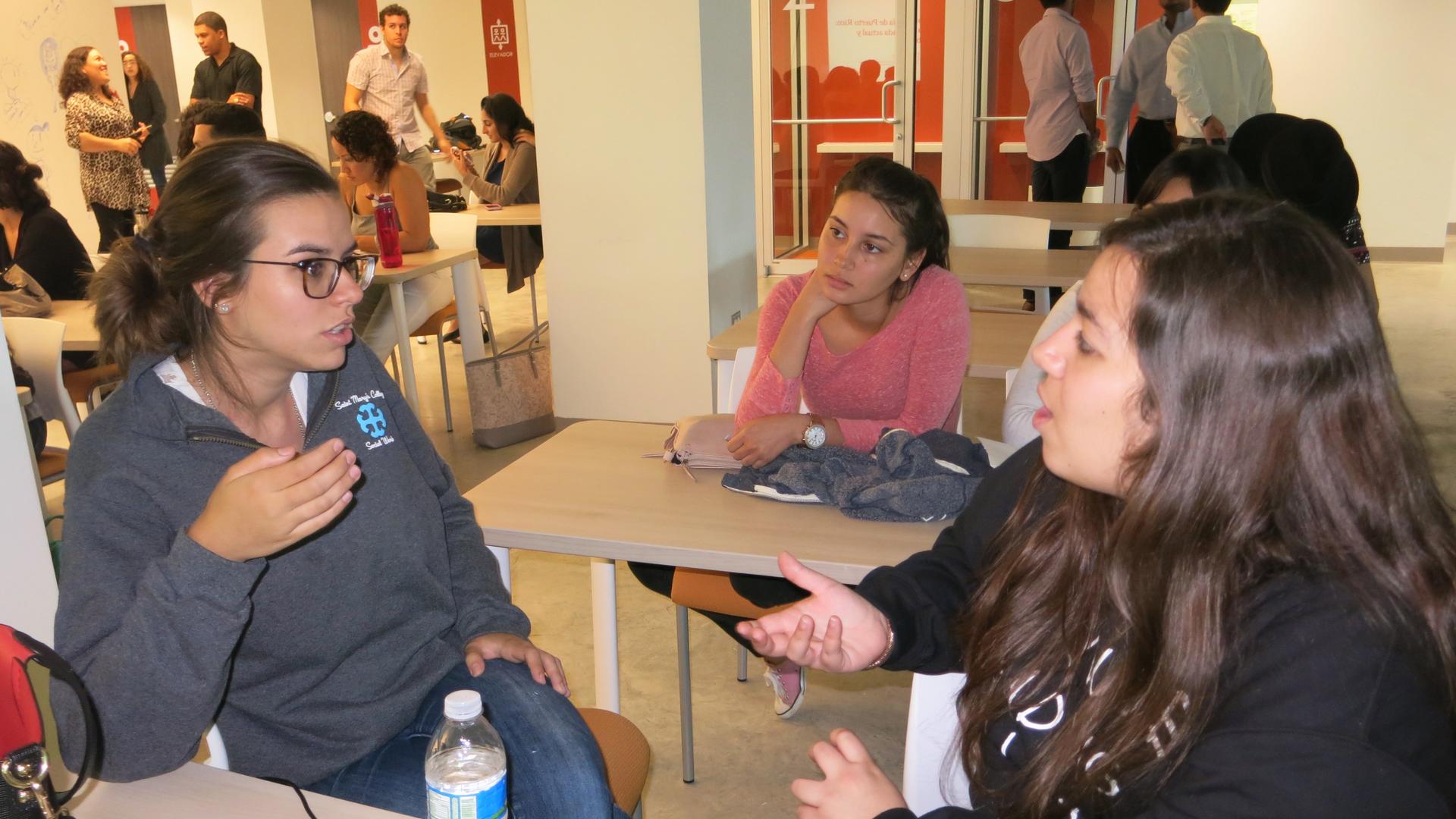Young Puerto Ricans debate what it means to be Puerto Rican and American
Puerto Rican college students Nina Croatto, from left, Tatiana Rodríguez and Paulina Colón are participating in the summer leadership program, "Puerto Rican Minds in Action."
If you’re from, say, California or Michigan, would you say you’re a Californian or Michigander first, or an American? You probably haven’t spent all that much time pondering this. But ask a Puerto Rican that question — are you a Puerto Rican or an American first — and the responses can get pretty involved.
At a summer leadership session in San Juan for university students, with the group Puerto Rican Minds in Action, a few college students talked about their identities as Puerto Rican Americans.
“When someone asks me where I’m from, I just say I’m from Puerto Rico and I’m Puerto Rican,” said Nina Croatto. “But if they ask me, I say, ‘Yeah, I’m an American citizen.’ And it’s important for me to identify as that too.”
“Yes, I understand that, but how can I say I’m from some country that treats me differently, that treats me like a colony,” countered Roberto Nava. “It just doesn’t make any sense.”
“I understand your point and I respect it,” Paulina Colón said. “But being part of the US, even as a colony, I am part of it. That’s the way I see it. You need to be realistic, and be like: you’re Puerto Rican, but you’re also part of the United States. That’s the truth, that’s how it is.”
Four years ago, Puerto Ricans were asked to think about their collective identity at the ballot box, to vote if they should remain a US territory, become the 51st US state, or an independent country. A majority of voters wanted to end their territorial status, but they were divided as to what should come next, with no clear majority when you factor in people who left that second question blank.
In the classroom, zero students thought Puerto Rico would be better off as a US state. But the students were also divided over the other options. Nava said Puerto Rico should cut the cord entirely from Washington. Yes, it would be a rocky economic transition, he said, “but at least we’re going to have the power, the political power as Puerto Ricans, to take control of our country and not be subordinate to another country. We are Puerto Ricans, we talk Spanish, we have our own culture, and they are taking decisions over our people.”
But independence would mean renouncing his US passport, losing Medicare and Medicaid, the US Post Office, possibly the US dollar.
“It’s difficult to imagine a country without these things that we have been living with for a long time, but c’mon, there are thousands of countries that are independent and they can survive,” Nava said.
There was a lot of anger in the room toward Washington, partly because of Congress’ new plan to help Puerto Rico out of its dire fiscal situation. A bill passed through the Senate on Wednesday and is now headed to President Barack Obama’s desk; he has indicated he’ll sign it into law.
Puerto Rico owes $2 billion to its creditors on July 1, money it doesn’t have. The bill calls for a seven-member oversight board to restructure the island’s $70 billion debt. Only one of the board members would need to either live or work in Puerto Rico.
“It’s a giant slap in the face to any Puerto Rican. I think it demonstrates that the US has always had the ultimate power and that our government pretty much was worth nothing,” said Nidia Matos.
Matos, and many of the other students in the classroom in San Juan, attend college in the US. Matos says they’re treated as second-class citizens on the mainland.
“When I go over there, I’m told that I can’t speak Spanish, but when they come here, we have to accommodate their needs,” Matos said.
Adriana Velez concurred: “Just people asking me: ‘Do you have a green card? How did you get here? Do you have a visa?’ They don’t know our history.”
“I just don’t agree,” countered Croatto. “I just feel that’s crazy to feel that way. We’re practically a state. The only thing that we’re different is that we can’t vote for the president.”
Ignacio Pérez punched back: “As US citizens, we don’t have legitimate representation in Congress. We have a resident commissioner that we elect, we send to Congress, but he doesn’t have a vote.”
So what’s good about being a US territory? For one, Puerto Ricans don't have to pay US federal income tax.
“The US passport is actually a great thing,” said Valez. “And the chance to have our own culture, while still having great companies, US companies, I think it’s another good thing.”
Unsurprisingly, her comments set off another round of debate.
Add it all up, the time might be ripe for a change of some sort to Puerto Rico’s political status. Then again, Puerto Ricans have been debating this topic for more than a century.
We want to hear your feedback so we can keep improving our website, theworld.org. Please fill out this quick survey and let us know your thoughts (your answers will be anonymous). Thanks for your time!
